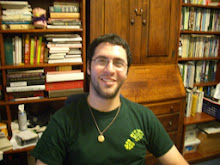This past Sunday, Fr. Antinarelli gave one of the best homilies I have heard preach. Yes, father said a very true statement about insurance companies (he said that they are "legalized thievery"). More importantly he talked about suffering. He talked of the cross. The cross, the tool of our Lord's death gives meaning to our suffering. He reminded all that there is spiritual fruits to suffering. He used the example of John Paul II. As a result of an assassination attempt, John Paul II developed Parkinson's Disease. Many called for his resignation, but he did not give up the throne of Peter. Rather, he accepted his suffering with love and out of love of the Churches. He showed that life has value.
Now these ideas that Father talked about are by no means original. In fact they have been written about preached about and spoken of. That being said, in this day and age, to be reminded again that suffering does, in fact have a purpose. In this secular world of ours, many people use suffering as a way to disprove God. However, we must understand that while God does not create suffering. He allows suffering to test the faithful. This is a way to see how faithful one is. He does so to remind us how much we need Him. It is especially so in the case of non-believers. Let us take Haiti. As my friend and mentor, David Higbee stated (I think I'm not getting this exactly right, but the general idea is there), "Haiti has been ruined by Voodoo". Here we have a country governed by a corrupt government with the most anti-God sentiments possible. This government was ill prepared for a natural disaster. The results were, as we all saw, catastrophic. It is in times of suffering that God gives us comfort. Now returning to the center point, we must always focus on the cross. For this we understand that suffering has a greater purpose. We do not choose our suffering but rather we accept it.
In bringing up the example of John Paul II, Father Antinarelli gave us a modern day example of accepting one's suffering. John Paul II never resented his suffering, rather, he kept his eyes on the cross and thus became a shining light. It is in John Paul II's acceptance of his suffering that we are reminded that our suffering is nothing compared to the mortification and suffering of Christ. As we go upon our Lenten journey, we are ever mindful of the cross. Let us always remember in times of trouble that we should not complain, but rather fix our eyes on the cross, and allow Christ to comfort us.
Subscribe to:
Post Comments (Atom)

I do not disagree that Haiti's government is one of the most corrupt and "anti-God." However, to presume that their anti-God sentiments are what caused the horrific earthquake on January 12 is completely unreasonable. Haiti was ill-equipped to prepare for an earthquake of this magnitude because it is extremely poor and under-developed, not because they practice Voodoo. Additionally, Haiti is situated right on top of a strike-slip fault, the mechanism for this terrible quake. Are all natural disasters caused by God as a response to Voodoo or other "anti-God" sentiments? Do some research next time and don't just accept everything you hear from the Church-why else would you have a brain capable of thinking for itself?
ReplyDeleteWow, that is a very good point. I'm not one to say God sits up there and zaps people who disobey. He allows these things to happen. The point I was trying to draw with that regard is that the poverty and ill-preparedness is due to this corrupt government. A government that has gone against God in the case of Haiti has become greedy. It is in ill position to aid its impoverished population. The ill-preparedness is amplified by a corrupt government not looking out for the good of its people.
ReplyDeleteThat way, knowing it was on a fault line, they could have seen the warning signs and been better equipped to respond.
I invite to read my posts more carefully. I'm not so mindless as you think. I don't blindly follow. The friend who said that is a well-traveled person (much more so than myself). He has seen these things with his own eyes. He is not a church authority, he just happens to have knowledge of the subject and is in fact, Catholic.